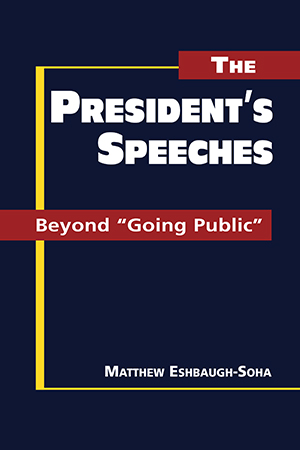Why do presidents bother to give speeches when their words rarely move public opinion? Arguing that "going public" isn't really about going to the public at all, Matthew Eshbaugh-Soha explores to whom presidential speeches are in fact targeted, and what—if any—influence they have on public policy.
Eshbaugh-Soha shows that, when presidents speak, their intent is to provide legislators and bureaucrats with cues pointing to particular policy decisions. Analyzing 50 years of presidential rhetoric, he demonstrates the impact of such "presidential signaling" vis-à-vis a range of policy areas. He finds that, although citizen support may increase the likelihood that a legislator will respond to presidential signals, it is not essential to a president's legislative success.
Matthew Eshbaugh-Soha is assistant professor of political science at the University of North Texas.
"It would behoove scholars studying the presidency and interbranch relations to examine this work closely.... Eshbaugh-Soha's 'alternative to the going-public model' opens a new approach to understanding how presidents use the bully pulpit and furthers that important inquiry."—Brandon Rottinghaus, Presidential Studies Quarterly
"An innovative and responsible attempt to recast the 'going public' option in presidential politics."—Philip Abbott, Political Science Quarterly
"Provides an excellent starting point to challenge an important contemporary theory of presidential power."—Choice
"One of the great unanswered questions of presidency scholars is why presidents try so hard to influence public opinion when the effort seems likely to be futile. Eshbaugh-Soha answers that question by looking at the indirect effects of presidential rhetoric. The result is essential reading."—Andrew Dowdle, University of Arkansas






